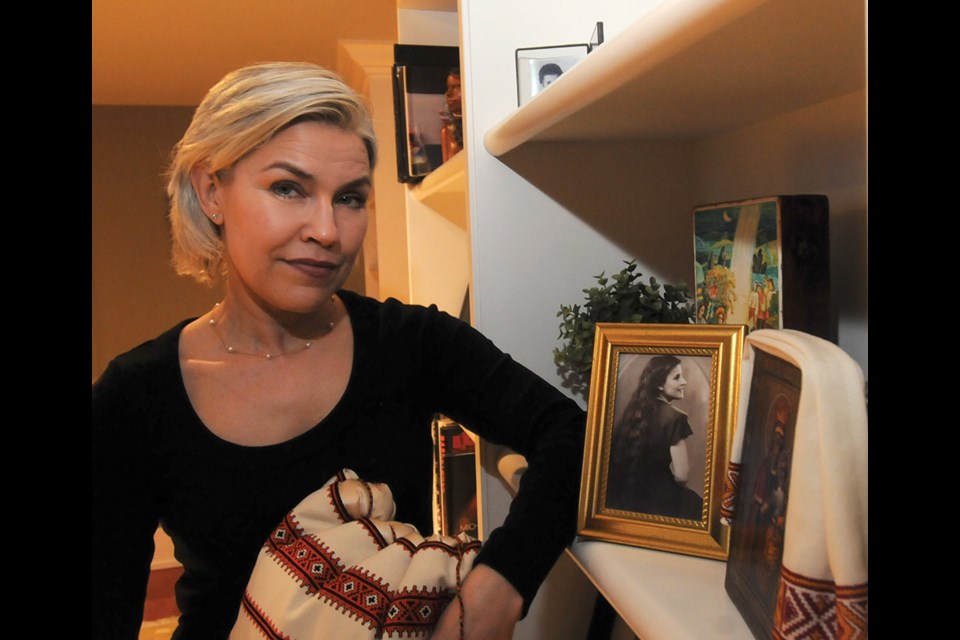Lisa Upton of North Â鶹´«Ã½Ó³»has watched flickering images of explosions in Ukraine for almost a week now with a sense of horror and disbelief.
Though she was born in Canada, her family has strong roots in Ukraine.
“My first language was Ukrainian,” she said. Upton still speaks the language and has travelled to the city of Vinnytsia to teach English to Ukrainian students. Her Canadian aunt was also part of a Canadian delegation of neutral observers of Ukrainian elections. Her family has long been part of a movement to protect and restore Ukrainian culture and language.
Now Upton can only worry and hope from a distance, as Russian military forces invade the country where members of her family still live.
Ukrainian cousin serving in military
One of her cousins is serving in the Ukrainian military, stationed at an airport near the capital city of Kyiv, where active fighting is taking place. That cousin has sent her children with an older sister who has fled to the southwest of the country, near to the Romania border.
Another cousin is a nurse living in the western Ukrainian city of Ivano-Frankivsk, who has been called to the hospital to prepare for an influx of wounded. Her husband is now working in a factory, making barriers to stop tanks, said Upton.
Originally, the couple planned to send their teenaged children to the Polish border with grandparents, but long waits to cross the border in the cold made that unworkable for elderly family members. Now they’ll have to think about a Plan B, said Upton – which likely involves sending their kids out of the city to villages nearby. “The feeling is being out of the city you’re safer, because you’re not going to be bombed,” she said.
While men aged 18-60 are banned from leaving Ukraine under martial law, Upton’s 65-year-old cousin who lives in downtown Kyiv has opted to stay in the country too.
Family member in Kyiv refuses to leave city
“Yes, he could have left the country but that's not his personality. He’s a very determined person,” she said. That cousin is hunkered down in his apartment, retreating to the relative safety of the basement when air raid sirens go off.
Like everyone else who watched the escalation of tensions on the Ukrainian border in recent weeks, “You kind of think it’s not going to happen,” said Upton of a full-scale Russian invasion. “It’s happening now.”
Like many people with family in Ukraine, Upton has spent late nights scrolling through Twitter getting first-hand reports from Kyiv, where missile strikes were happening Tuesday.
“It’s very personally disturbing and haunting to see history repeating itself,” she said.
For Upton’s family, the history of Ukrainian people is inexorably bound up in their own.
Long family history in Ukraine
Her family comes from the city of Ivano-Frankivsk, in western Ukraine. During the Second World War, the city (then part of Poland) was invaded successively by both the Soviet army and occupying forces of Nazi Germany. (Ukraine and its rich agricultural and energy resources have long been a source of wars and border skirmishes between Ukraine, Russia and other European neighbours throughout its long history.)
Upton's grandparents were part of the resistance to Soviet occupation in the first part of the war, and were eventually forced to flee into the Carpathian Mountains. They were caught by the Nazis, and sent to a forced labour camp, where their baby – who would have been Upton's uncle – died after being poisoned. Upton's mother, Zoriana, was born in a displaced persons camp near Stuttgart, after the end of the war. The family arrived in Canada in 1948.
Before Thursday, Ukraine was like many other large European countries, with millions of people going about their daily lives, said Upton, who has visited the country twice.
Imagine a tank rolling down your street
“Imagine in North Â鶹´«Ã½Ó³»a tank rolling down your cul de sac,” she said. “This is what this is.”
The Ukrainian community in the Lower Mainland is strong, said Upton, adding groups will soon be fundraising to provide aid to fleeing civilians. On Tuesday, The United Nations High Commission on Refugees estimated 660,000 people had fled Ukraine in the past six days.
She added she feels confident that deputy prime minister Chrystia Freeland – whose family is from the same area of western Ukrainian and who has a deep connection with the region – will handle the crisis in the right way. “I feel grateful for her,” she said. “We’ve got the right people in Canada working on this problem.”
She’s also taken heart from video images of people protesting against the invasion from within Russia. “They’ve been incredibly brave,” she said.
Upton said her mom, who is visiting from Toronto, has been very upset by the situation in her home country. “It’s her family,” she said. “It’s her people.”
Her own family members in Ukraine are committed to defending their country as an independent nation. "My family's going to fight," she said.
Upton said it’s hard to imagine waking up in the morning and trying to decide if you should take your kids to a bomb shelter. “People were literally waking up at 5 a.m. and wondering where to go,” she said. “These are just regular people like you and me.”




